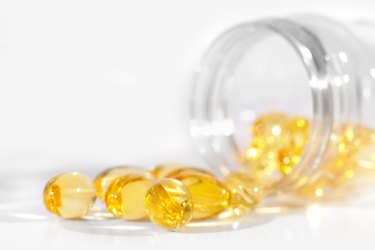
When researchers discovered vitamin E in 1922, it set the health world ablaze with its wonders and the potential impact this antioxidant could have on the human body. Vitamin E benefits for men were theorized to include cardiovascular benefits that extended throughout the body to the penis. However, decades of recent scientific studies show that vitamin E won't help you in the bedroom and getting too much can actually harm your health.
Tip
There are no scientifically proven benefits for male sexual performance from vitamin E. In fact, taking too much puts you at risk for prostate cancer, stroke and early death.
Video of the Day
Vitamin E's Role in the Body
Vitamin E acts primarily as an antioxidant in the body. Oxidants occur when the body produces energy by removing electrons from fatty acids, amino acids and sugars and combines them with other molecules, including oxygen. The byproduct of this process is free radicals, theorized to contribute to the aging and disease process.
Video of the Day
Antioxidants like vitamin E might help decrease the body's exposure to oxidants by becoming oxidized themselves, according to the University of California, Berkeley. Although the body produces its own antioxidants and gets more from natural foods, vitamin E's antioxidant properties made it widely popular as a potential elixir to promote good cardiovascular health as well as thickening blood vessels that could make a man a top performer in the bedroom.
So What's the Problem?
Unfortunately, theories about vitamin E's benefits for increasing sex drive, solid erections and cardiovascular system haven't held up in scientific studies. Although something could be said for the placebo effect, in vitamin E's case, it can do more harm than good.
Read more: What Vitamins Are Good for Sexual Stamina?
Vitamin E and Prostate Cancer
Studies on vitamin E in recent years have dwindled, due to disappointing results. In 2011, a study published in the Journal of American Medical Association concluded that the risk of developing prostate cancer increased dramatically in men taking 400 international units of supplementation for seven years.
Erectile dysfunction is the most common side effect of prostate cancer, according to the Prostate Cancer Foundation, and might eliminate your sex life altogether, depending on whether nerves get damaged by treatment. Urinary and bowel dysfunction are other very real risks.
Vitamin E and Cardiac Events
The Heart Outcomes Prevention Evaluation that followed more than 10,000 heart patients over the course of 22 years found that patients who used 400 international units of vitamin E had a greater statistical number of cardiac events and more hospitalizations than those who took a placebo. Supplementing with vitamin E increased the probability of being hospitalized for heart failure by 21 percent. Additional studies link vitamin E supplementation with an increased risk of hemorrhagic strokes.
Read more: 43 Supplements Exposed
Enough Is Enough
Some substances pass easily into the urine, such as vitamin C, meaning there's no risk of taking too much. Vitamin E in its eight forms of tocopherols and tocotrienols is fat-soluble, meaning it's able to be stored in your body's fat reserves. Although it's necessary for your body, taking too much can cause toxic reactions such as cancer or thin blood to the point of increased stroke risk.
Most men in the U.S. have no problem getting the required amount of vitamin E in their diet for optimal sexual function, which is 15 milligrams or 22 international units per day for men over age 14. Natural sources are best absorbed by the body and include whole grains, enriched foods, nuts, seeds and leafy greens. Vitamin E deficiency is usually only a concern for those with specific, rare genetic disorders or malnutrition.
Wheat germ oil provides the best source of natural vitamin E at 20.3 milligrams per serving. Add 1 tablespoon to a smoothie or salad dressing to get 100 percent of the recommended daily allowance of this important but potentially toxic vitamin.
- National Institutes of Health: Office of Dietary Supplements: Vitamin E
- Berkeley Wellness: Should Anyone Still Take Vitamin E?
- Oregon State University: Linus Pauling Institute: Vitamin E and Prostate Cancer
- Berkeley Wellness: How Antioxidants Work
- Mayo Clinic: Vitamin E
- Prostate Cancer Foundation: Prostate Cancer Side Effects
- MayoClinic.com: Testosterone Therapy